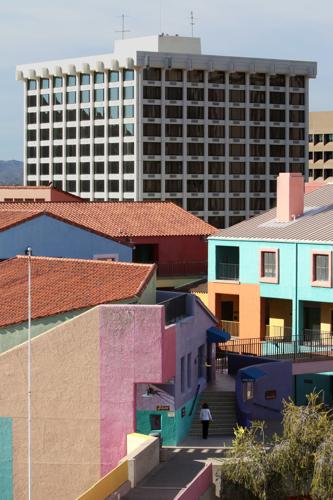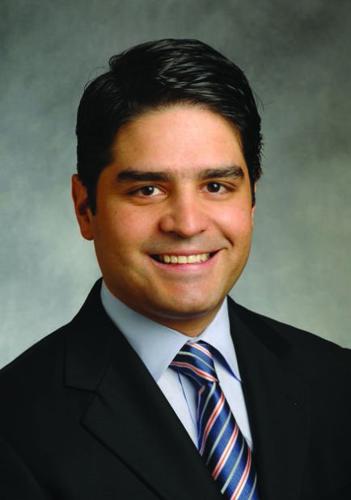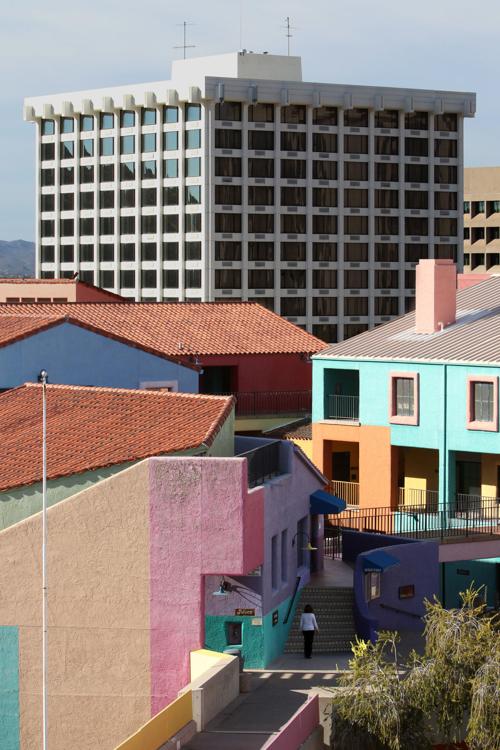HSL Properties is back at it.
They’re asking for a taxpayer subsidy for a downtown Tucson development. Again.
In case you’re new in town, you should know this is a tradition. Under Humberto S. Lopez, the company’s founder, HSL has been asking for public help to develop its downtown properties since the 1980s. Most recently, the company asked the city to buy his closed Hotel Arizona, at 181 W. Broadway, and lease it back to him, while also selling tax-free bonds to upgrade it.
The city said no, as recently as 2010.
Now Lopez’s nephew, Omar Mireles, is in charge of HSL, and he puts a less confrontational face on the company, which mostly owns and operates apartment complexes.
But in its downtown holdings, the M.O. remains the same. HSL asked last week for an eight-year property-tax abatement to build 246 apartments at the site of La Placita Village, the colorful office complex at the southwest corner of Broadway and Church.
This is not that surprising. Most of the recent downtown projects are getting the so called Government Property Lease Excise Tax, or GPLET, break.
What’s different about the La Placita project is the history with HSL — and the fact that the project is right next door to the hotel that Lopez closed in 2012, in apparent frustration with the city for not underwriting his development.
“Everybody thinks about all this tumultuous history,” Councilman Paul Cunningham said during a City Council study session Tuesday. “That’s the elephant in the room. But it doesn’t really matter, if everybody’s acting in good faith and their intentions are just. This is the kind of thing you go forward with.”
Maybe he’s right. Or maybe this is the opportunity the city has been looking for, to start weaning developers from incentives and maybe to force progress on the hotel.
After years of expensive nurturing, downtown may be at a place where good projects don’t actually need tax breaks in order to succeed. HSL has already scheduled demolition of all but three historically significant structures in La Placita Village for May, which suggests the project is ready to go ahead. Mireles said construction could begin as early as June.
It is also a market-rate project, so big money will be coming in once the apartments are built and rented. Asked at the study session what the rents will be, Mireles said current projections are about $900 for a studio apartment, $1,200 for a one-bedroom and on up to $3,000 for a four-bedroom.
Those are pretty expensive places for Tucson, but Mireles said that’s what the market dictates now.
“I’m surprised that this isn’t a viable project without a GPLET,” Councilwoman Karin Uhlich said Tuesday. “That’s one of the things that is part of the analysis, that this place would not happen in the same time place and manner — which is very general language — without a GPLET.”
Councilman Steve Kozachik asked, “Do you walk away from your plans if the analysis says it doesn’t merit an eight-year abatement?”
That’s the city’s first challenge: Should it call HSL’s bluff and start easing out of the incentive business? After all, as Uhlich pointed out, the streetcar has already raised property values along the line, which runs right in front of both La Placita and the hotel next door.
Contrasting it with the hotel, Mireles said of the apartment project: “The reality that we see is that right now the market is right for this project. The demand is there, and the demand going forward will improve.”
The city is under no obligation to approve the GPLET, the city’s economic development manager, Camila Bekat, explained to me.
“A GPLET is a discretionary incentive,” she said. “You might meet the criteria, but the council has the discretion.”
HSL’s request for the incentive represents something the city hasn’t had with this company for a long time: leverage. HSL has used its vacant hotel in the middle of downtown as leverage to try to persuade the city to put big money into a renovation. So far it hasn’t worked.
Now the city has the leverage of this request by HSL for a tax abatement. Maybe the city could make the granting of the GPLET conditional on some sort of movement by HSL toward renovating and reopening the embarrassing hotel.
It’s a topic that council members and Mireles danced around during the council meeting. When I asked Mireles on Friday if the two projects could be brought together as part of a bigger deal, he said no.
“These are two very separate and different projects at the end of the day,” he said.
He noted that while both are HSL-owned properties now, different investor groups will own the completed projects.
The city has been in negotiations with HSL and the Rio Nuevo Multifacilities District for more than a year on the hotel. It has not progressed much, and there hasn’t even been a new informal proposal for more than a year.
“We’re still trying to figure out how to make the numbers work,” Mireles told me. “If we could make it pencil out, believe me, we’d want that sore topic out of the way.”
I understand a renovated downtown hotel is not necessarily a winning prospect right now. But I can’t be the only one who noticed that HSL has bought the Hilton El Conquistador and the Ritz-Carlton Dove Mountain in the last couple of years. Mireles said they’re different businesses with different prospects. Fine.
But it shows that this is a company, HSL, that by all appearances is doing well financially, yet has left the eyesore in the center of downtown vacant, without progress, for almost five years. Perhaps what HSL needs is a little incentive to start moving on the hotel — you know what I mean? Like a GPLET on a neighboring project HSL is also pursuing.







